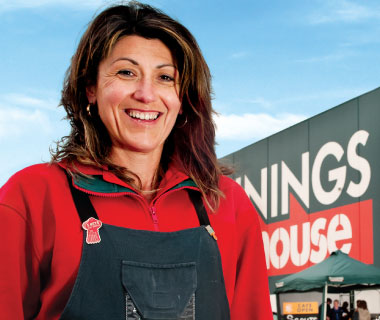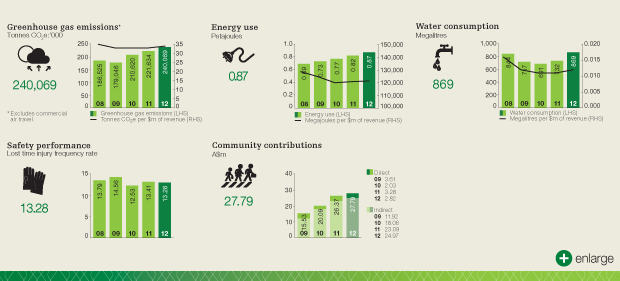Bunnings
We have a history of taking real action towards reducing our impact and building a more sustainable business.
More Info
We have a history of taking real action towards reducing our impact and building a more sustainable business.
More Info
Bunnings is the leading retailer of home improvement and outdoor living products in Australia and New Zealand and a major supplier to project builders, commercial trades people and the housing industry.
Operating from a network of large warehouse stores, smaller format stores, trade centres and frame and truss manufacturing sites, Bunnings caters for consumer and commercial customers.
Sales revenue during the year was $7.2 billion. At year end, there were 206 warehouses, 58 smaller format stores, 36 trade centres and five frame and truss centres operating across Australia and New Zealand.
At 30 June 2012, we employed more than 32,000 team members.

This year, we continued to progress initiatives across our sustainability agenda aimed at:
Our commitment to our ‘we live here too’ philosophy delivered benefits to the local community, with our Australian and New Zealand stores raising more than $27 million and supporting more than 42,000 team member-led community activities.
All our warehouses held free DIY workshops throughout the year, with sustainability-focused workshops providing customers with practical advice on sustainable living.
We continued our zero tolerance approach to illegally logged timber in our supply chain by only sourcing timber products from low‑risk plantations or other verified legal or certified sustainable forest operations.
Our Australian stores achieved a waste recycling rate of 65 per cent, a nine per cent lift on last year’s recycling rate. We also conducted evaluations in emerging energy efficient lighting technology such as power factor correction and commercial rooftop solar systems.
Investing in team member development is a key priority. More than 690,000 hours of training were undertaken by our team focused on products, service, leadership and safety.
During the year, we extended ‘Authentic Leadership’, our primary development program for senior leaders. The program’s principles have been integrated into existing leadership programs.
A number of initiatives were run throughout the year to increase safety awareness and address areas of risk. During the March ‘Simply Safer’ campaign, we gathered more than 1,200 ideas from our team on how we can improve safety onsite, with many ideas implemented quickly.
Improvements were made to the packaging and shelf location of our bulkier products to make it easier and safer for our team and customers to lift and move them.
Despite a decrease in serious incidents throughout the year, there was an increase in our all injury frequency rate* from 36.6 to 38.8. In response, a reinvigorated safety strategy targeting our known injury hot spots and high risk activities is being implemented.
We continue to recognise the importance of a truly diverse workforce with regard to gender, age and ethnicity. Last year, 3,320 of our team members were 60 years or older, including 391 team members who were over 70 years old. We also continue to integrate team member awareness and involvement in Indigenous initiatives by creating opportunities through a number of localised programs. We aim to increase the participation of women in leadership roles by providing sustainable career paths from entry level onwards. We will continue to employ team members from a diverse range of backgrounds, as we believe this is what makes our team great.
*The AIFR measurement is the same calculation as TRIFR in this report.
Through our ‘we live here too’ philosophy, participating in our local communities is an integral part of the Bunnings business and we contribute to a diverse range of local, regional and national programs in Australia and New Zealand.
This year, our Australian and New Zealand teams supported more than 42,000 community activities including over 1,400 activities through the Bunnings Schools Sustainability Program. Australian stores also continued participation in Planet Ark’s Schools Tree Day by working with schools to plant native trees in the community.
Bunnings’ Australian stores also supported a number of organisations through locally driven activities. These included local emergency services groups, The Salvation Army, Legacy, and the St Vincent de Paul Society, amongst many other local community organisations.
Our New Zealand stores supported organisations such as the Child Cancer Foundation, The Heart Foundation, and Clean Up New Zealand Week, and continued their support of Christchurch’s earthquake rebuilding activities.
Through our ongoing local community support we were able to contribute and help raise more than $27 million. This assistance was made possible through fundraising sausage sizzles, DIY projects and renovations, local fundraising activities, community workshops, team member involvement, product contributions and financial assistance.
Stakeholder engagement (public policy)
We continue to engage and build relationships with different levels of government and non-government organisations (NGOs) to identify further opportunities to work together.
In 2012 we continued to play an active role in promoting a proposed ban on the importation of illegally logged timber.
We continue to work with WWF as a Global Forest and Trade Network (GFTN) member and with Forest Stewardship Council (FSC) Australia as a retail partner.
Bunnings was part of a joint timber industry, retailer and NGO steering group led by Planet Ark, which developed the first national wood products forum and workshop in May 2012. This event assisted in overcoming obstacles and promoted the uptake of certified timber products.
We have a strong partnership with Sustainability Victoria. In the past year, Sustainability Victoria delivered more than 500 in-store training programs to team members on sustainability related rebates and products.
Education and awareness
During the year, we supported Earth Hour, Recycling Week, World Environment Day and National Water Week with sustainable living DIY workshops and activities.
We participated in four showerhead exchange product stewardship programs in Victoria and Western Australia, exchanging more than 48,100 showerheads.
We are committed to minimising our impact on the environment, including energy efficiency measures, water conservation, responsible sourcing, packaging reduction, recycling and continuing our focus on sustainable timber procurement.
Energy
We continued to install energy efficient e-tronic lighting technology in new stores and stores undergoing refurbishment, with 41 stores now completed. We also continue to implement light emitting diode (LED) lighting in outdoor areas as standard in the new store design brief.
We also continue to closely evaluate the feasibility of emerging energy efficient LED high-bay lighting technology for our stores.
Greenhouse emissions
Our total greenhouse gas emissions (excluding commercial air travel) were 240,069 tonnes of CO2e, which is eight per cent up on last year. These emissions were largely due to electricity consumption at our stores.
The significant expansion of our store network has an obvious flow-on impact on the activities that affect our total carbon footprint. Despite this, our carbon intensity remained stable at 3.4 tonnes of CO2e per $100,000 of revenue.
Water
Scheme water use was 869 megalitres, which is an increase of 19 per cent overall. Notwithstanding the significant expansion in our store network, it is pleasing to note that the intensity of our water use has reduced by 31 per cent compared to the intensity of water use five years ago. Our water conservation and reduction efforts continue with the installation of rainwater tanks and capillary mats in all new stores.
Reducing waste and recycling
We continue to work towards our 85 per cent waste diversion target. This year, we diverted approximately 64 per cent by volume of this waste via various recycling and packaging initiatives, up from 60 per cent last year. During the year, we disposed of 22,061 tonnes of waste to landfill, recycled 17,861 tonnes of cardboard and paper, 2,670 tonnes of plastics and 10,184 tonnes of other recyclables including timber.
As part of Bunnings’ ongoing commitment to improving product packaging efficiency, we worked with our store-based Green Action Groups. Stores identified product packaging opportunities which improves their fitness for purpose and will help reduce waste product being sent to landfill.
To reduce our waste to landfill we extended a trial for the re-use of waste timber pallets. We have 62 stores participating in this initiative, which involves returning waste pallets to the transport hub for re-use.
The trial has resulted in 12,576 pallets being recovered, cost savings of $107,116 and avoiding 513 tonnes of CO2e emissions to landfill.
An organic waste recycling stream for greenlife organic waste from our nurseries has been implemented in 16 stores with larger nursery areas.
Ethical sourcing
Bunnings has a zero tolerance approach to illegal timber in its supply chain. It is a condition of supply that independent verification is undertaken of legal origin as a minimum for all products made completely from tropical hardwoods.
All of our timber products are sourced from low-risk plantations or other verified legal or certified sustainable forest operations. Approximately 88 per cent of timber products are from certified sustainable sources, including 29 per cent that are FSC-certified.
Our New Zealand operations continue to work collaboratively with the government, industry and environmental organisations to encourage sustainable timber procurement.
As part of our Responsible Sourcing Program, Bunnings became a member of Sedex (Supplier Ethical Data Exchange) in 2012. This membership improves transparency in our supply chains in the areas of labour standards, health and safety, environmental management and business integrity.
We continued our factory accreditation program for products we directly import. Major overseas factories are audited to a Code of Conduct based on the International Labour Organization conventions. During the year, a total of 196 audits were conducted.